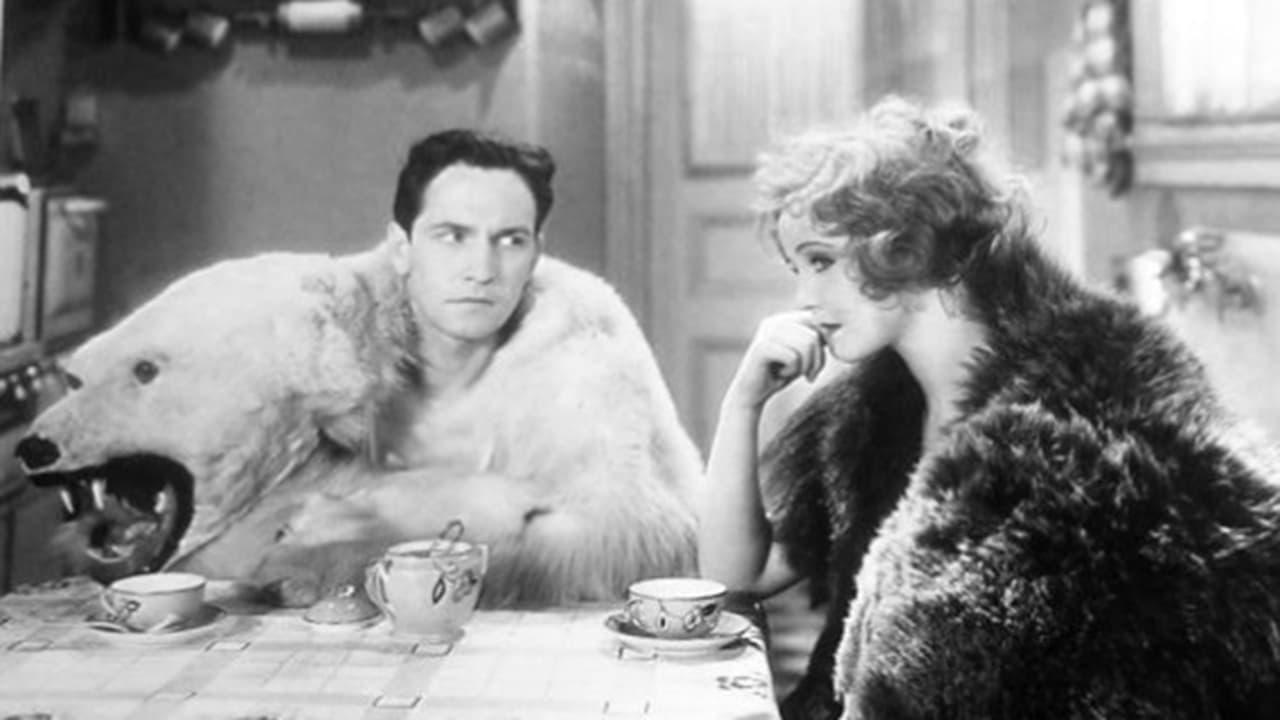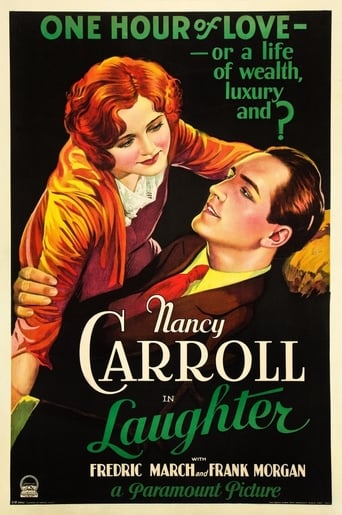2hotFeature
one of my absolute favorites!
MonsterPerfect
Good idea lost in the noise
Married Baby
Just intense enough to provide a much-needed diversion, just lightweight enough to make you forget about it soon after it’s over. It’s not exactly “good,” per se, but it does what it sets out to do in terms of putting us on edge, which makes it … successful?
Juana
what a terribly boring film. I'm sorry but this is absolutely not deserving of best picture and will be forgotten quickly. Entertaining and engaging cinema? No. Nothing performances with flat faces and mistaking silence for subtlety.
marcslope
Those describing this as an early screwball comedy are telling only half the story--it's also a romantic drama, and, more surprisingly, an existential meditation. The theme is, as noted, quite reminiscent of "Holiday" and the later "The Philadelphia Story"--love among the privileged, with interlopers from the less privileged, and the ability or lack thereof to have a sense of humor in high society. But it's quite sad, too -- Glenn Anders' character meets a sorry end, and that ruins Diane Ellis's life. What's really moving is watching Nancy Carroll, never more radiant, having to choose between security and her true self, and her interaction with Fredric March, unusually loose and spontaneous; their scene in the cab actually moved me to tears, both for its content and their playing of it. This is how it's done, folks. For a screwball prototype it has unusual depth of feeling. Add to that sumptuous Deco trimmings, technical prowess that belie its Astoria Studios origins, and some exciting location New York filming. Hard to catch a copy of this one, but it's worth the search.
calvinnme
... or make a wise decision concerning your future for that matter. The life of ex-chorus girl Peggy (Nancy Carroll) now socialite wife to public utilities king C. Morton Gibson (Frank Morgan) seems to be an object lesson in this fact. Peggy is already a millionaire's wife by the time the film opens, so we don't see any of her past life, just the human remnants of it. First there's Ralph, an overwrought starving artist who is obsessed with memories of Peggy but whom Peggy never apparently loved. Next there's Paul Lockridge (Fredric March), starving musician, whom Peggy did love but was overseas at the time she made the decision to marry Gibson, and thus could not plead his case.Peggy doesn't have to worry about being hungry anymore, in fact she doesn't have to worry about anything in her new life. However, her husband treats her like a cross between a bird in a gilded cage and a welfare case, always talking about her "unfortunate past" and scrutinizing her every unexplained absence. Neither is he a particularly passionate fellow - accumulating more and more cash is his real passion. The lack of joy in Peggy's life comes to the surface when Paul returns from Europe to win her back. His only asset - laughter, the joy of life lived experience by experience. Add to this a chance meeting of Peggy's unstable old suitor, Ralph, with Peggy's new stepdaughter, Marjorie, that turns romantic and complications abound.This is a rather understated film, nothing is particularly laugh-out-loud funny or horribly suspenseful and melodramatic save for a couple of short scenes in each case. Thus the film's success largely rests on the acting of the performers, which is quite good. Since this film was made in 1930, many might think it is about the desperate decisions and trade-offs people had to make to keep eating during those times, but it really predates the depression.This is a good one for fans of Nancy Carroll, who plays her understated role very well - that of a decent woman whose profession of chorus girl guarantees not only that she has just a few good years to make a decision on the only profession that could come afterwards for such women in the 1920's - marrying well, but that everyone automatically doubts her character because of her profession.
kidboots
Nancy Carroll was the first girl to reach stardom in the talkies, she was the first girl to sing a song into a movie microphone, she was the first girl to do a tap dance on a studio sound stage and she was the star of arguably the first sophisticated "screwball" comedy. "Laughter' was the first Nancy Carroll movie I ever saw (over 35 years ago) and I was disappointed - where was the Nancy I knew from photos in books about the early musicals, the dancing Nancy in feathers and silky costumes. Now, after seeing quite a few of her films, I realise she can do anything. Whether the part called for a chorus cutie ("Close Harmony", "Sweetie") emotional drama ("Dance of Life", "The Devil's Holiday") or scintilating comedy ("Laughter", "Springtime for Henry") she could do it all.Peggy (Nancy Carroll), a Follies beauty forsakes all her old suitors to marry an affable old millionaire, C. Mortimer Gibson (Frank Morgan) who, while he lavishes every luxury on her, is obsessed with making money. One of her rejected suitors, Ralph La Sainte (Glenn Anders), a sculptor, has taken it very hard and when Peggy visits him, she finds him suicidal, but manages to jolly him around.When Paul (Fredric March), yet another suitor, returns from Paris, where he went to forget, he is just as riotous and madcap as ever and Peggy finds it hard to resist his infectious good humor. She realises she is bored with a life of idle luxury and needs love and laughter but she now has an added responsibility, keeping her step daughter, Marjorie (Diane Ellis) on the straight and narrow as she is fresh off the boat from finishing school and wants to kick up her heels. In an effort to help her discover laughter again, Paul takes Peggy on a drive. This sequence with it's zany humor and quirky oneliners that ends in their dressing up in bear skins and chasing each other around an empty house shows the beginnings of the "screwball" genre. The day ends unhappily as police arrest them for housebreaking and Peggy has to put up with a heated lecture from her irate husband.During a costume party, Peggy finds Marjorie missing and realising she may be running away with Ralph, who she is infatuated with, goes to his rooms to try and stop her. To bring Marjorie to her senses, she tells her that Ralph is only marrying her on the rebound and when Ralph stays silent, Marjorie flees from his rooms in tears. Peggy then realises her future is with Paul and that she needs love and laughter rather than luxuries. The very end scene has you wondering whether Paul's wit and charm will be enough to sustain Peggy as she looks longingly at a diamond bracelet.It is great to see Fredric March in these early roles, he was very versatile. "Laughter" was Diane Ellis' last movie. She had been a sweet ingenue who may well have developed into a competent actress - who knows? she died mysteriously in India on her honeymoon.Highly, Highly Recommended.
cocoanut_grove
"Laughter" is a glorious romantic comedy with a terrific cast including that great man of the screen, Fredric March. It concerns a young woman who has married for stability and wealth, but can't forget the love of her life, played by the delicious Mr March. It was made at Paramount's Long Island studios, and some scenes were shot on location in New York, giving the movie a different "look" to many others of the period. Some people think of this movie as the first "Screwball" comedy. "Laughter" was Frank Morgan's first talkie and the last movie for Diane Ellis who plays his daughter. She died on her honeymoon in December 1930.

